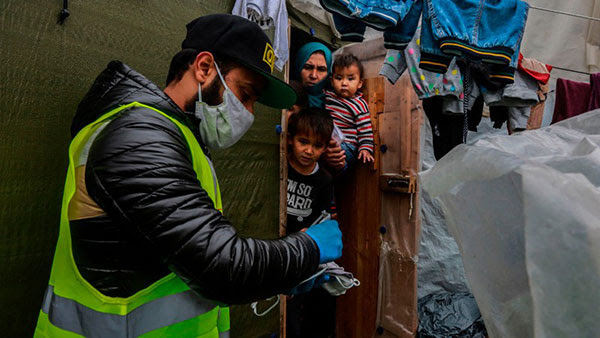
An aid worker provides protective face masks to migrants in Greece. (Manolis Lagoutaris/AFP/Getty)
Refugee camps brace for deadly impacts
Close living quarters, widespread underlying health problems and limited access to sanitation and medical care mean that COVID-19 poses an outsized threat to the 70 million refugees, displaced people and asylum seekers around the world. “Any kind of epidemic is never good, but particularly not this one, where physical distancing is impossible and home isolation is a joke,” says Annick Antierens. (Nature | 3 min read)Doctors rethink rush to ventilate COVID-19 patients
Mechanical ventilators are crucial for saving the lives of some people with COVID-19 — but physicians are increasingly becoming more hesitant to use them too often. Early data indicate that the survival rates of critically ill people with COVID-19 who are mechanically ventilated appear to be lower than expected. The treatment is invasive — it involves a tube in the airway and sedation — and requires a highly trained operator. “It’s not just about running out of ventilators, it’s running out of expertise,” says pulmonology and critical-care physician David Hill. (Reuters | 11 min read or in graphic form)
Makers turn to their 3D printers to stop COVID-19
Engineers, designers and hobbyists are turning to open-source methods to produce tools for testing and treating coronavirus. Explore some of the most successful designs, the challenges these designs face and how the open-source approach might bring lasting changes to how things are done. (Nature | 8 min read)
Draft remidesivir results released by accident
The premature release of results from a long-awaited clinical trial conducted in China dampens hopes that the antiviral medicine remdesivir might speed recovery of people with COVID-19. According to a summary that was temporarily visible on the World Health Organization website, remdesivir was “not associated with a difference in time to clinical improvement” compared with a standard-of-care control. The drug’s maker, Gilead Sciences, says the post was a draft, included “inappropriate characterization of the study” and didn’t reflect “trends in the data [that] suggest a potential benefit for remdesivir, particularly among patients treated early in disease”. Gilead says the study manuscript is now in peer review. (STAT | 6 min read)
What happens after you survive
For those people who recover from a severe bout of COVID-19, both the illness and the treatment can have lingering effects. Clinicians are learning lessons from other diseases about the physical, cognitive and mental-health problems that might be in store. (Science | 5 min read)
Don’t drink or inject bleach, you could die
Doctors and manufacturers are warning people against injecting or consuming bleach or any household cleaning product after statements by US President Donald Trump in today’s White House coronavirus task force briefing. Responding to research confirming that disinfectants kill the virus on surfaces, Trump suggested researchers investigate whether “we can do something like that, by injection inside”. Trump responded to evidence that sunlight impedes virus transmission via surfaces by suggesting “we hit the body with a tremendous — whether it's ultraviolet or just very powerful light”. Physician Deborah Birx, the US coronavirus response coordinator, stated in the same briefing that light is not a treatment for coronavirus. (BBC | 6 min read)Read the latest coronavirus news, continuously updated on Nature.
Read Nature’s continuously updated selection of the must-read papers and preprints on COVID-19.





















.png)












No hay comentarios:
Publicar un comentario